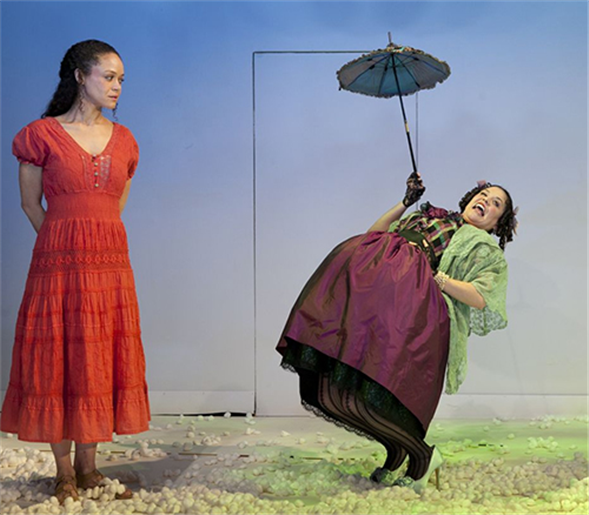You’re Melodramatic. Just Accept It.
Home > TDF Stages > You’re Melodramatic. Just Accept It.

In An Octoroon, Brandon Jacobs-Jenkins explodes theatrical history
—
What do we do with melodrama today? Can a world of excessive emotion, mustache-twirling villains, tragic heroines, and exaggerated racial stereotypes have any resonance with our own? Or are we already inundated with melodramatic techniques—and the social norms they imply—without even realizing it?
These questions are partly what drove Branden Jacobs-Jenkins to write An Octoroon, his contemporary confrontation of a landmark 1859 melodrama. (It’s performing at Soho Rep through June 8.)
The older play, Dion Boucicault’s The Octoroon, tells the story of Zoe, the one-eighth African daughter of a deceased plantation owner, and it has stayed with Jacobs-Jenkins for years. “It’s just a play that I’ve genuinely been obsessed with for a very long time,” he says, adding that he’s especially drawn to “its active and very open obsession with the instability of any identity.” Even the character breakdown is fascinating, he says, because Boucicault “specifies the color of the slaves, and I realized it’s because he had all these different shades of blackface happening. Because, you know, they were all white actors.”
Jacobs-Jenkins has explored race and identity before, including in his recent hit Appropriate, about a white family that finds a book of lynching photographs in their ancestral Southern home. But in An Octoroon, he foregrounds his personal relationship to the issues at hand. The piece opens with an actor who identifies himself as a “black playwright” (the quotes are in the script). The playwright, who is called BJJ, then introduces the idea of adapting Boucicault and the difficulties of doing so.
“That whole [opening] monologue is about how in everything that ever gets written about me, my race gets called out, and how that places expectations on what you can say or do in certain cultural spaces,” Jacobs-Jenkins says.
After that introduction, he delivers a modified version of the Boucicault, eliding characters and altering certain conventions in order to blend high melodrama with modern self-awareness. So while some actors are indeed still in blackface, they’re joined by co-stars in whiteface, redface, and sometimes just their natural skin.
Ultimately, these touches make the play an investigation of the melodramatic form as well as personal identity, and according to Jacobs-Jenkins, those two subjects are linked.
“Melodrama is a set of codes that imagine that people are all the same on some basic level,” he says. “If you do the same actions in a certain sequence, they will always produce the same results, and if you follow that ad infinitum, it says something about fate and humanity and what we’re capable of.”
He continues that while melodrama may be equated with flowery language and stock characters, “actually it’s just about the excess of emotion. It’s the roots of film. Every time a freaking TV show plays a pop song in the background, that’s melodrama happening.”
How, then, to stage An Octoroon without ignoring any of these ideas? “We wanted it not to be like a period piece that you could hold at arms length and sort of look at in a box,” says director Sarah Benson, who’s also the artistic director of Soho Rep.
To that end, the design reflects the dual nature of the play: While original cello music plays over the scenes, actors in period-ish costumes and modern shoes are placed against black or white walls. “The white wall made the people pop,” says Benson, “and I think that the music and the sound support that somehow. And it’s those two things together that really make it work as a form.”
Meanwhile, in today’s world, where irony overhangs everything like a veil, a high-stakes melodrama requires particular rigor from the actors. As Benson says, the company has to make “a commitment to the extremity of the physical form, that you’re not commenting on it and laughing at the character, but actually being inside the form and taking it on.”
And if the result of all these cultural and artistic collisions is startling for audiences, then so much the better. “I’m always obsessed with ugly feelings in theatre,” says Jacobs-Jenkins. “I’m interested in anxiety in general, but I’m interested in anxiety in the theatre as a fruitful experience for people.”
—
Rachel Carpman is a writer and dramaturg in New Haven, Connecticut
Photo by Pavel Antonov
